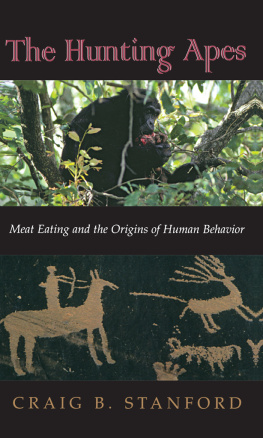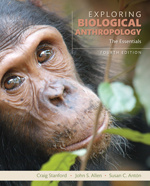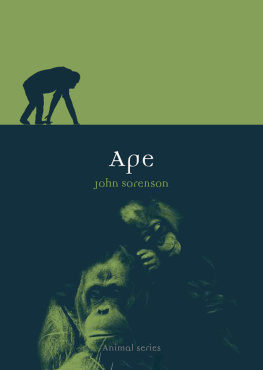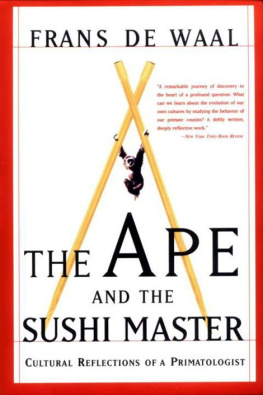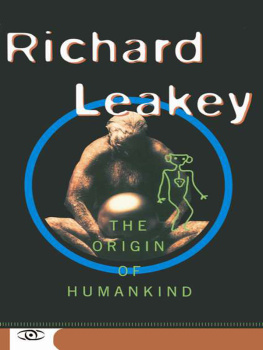Craig B. Stanford - The Hunting Apes: Meat Eating and the Origins of Human Behavior
Here you can read online Craig B. Stanford - The Hunting Apes: Meat Eating and the Origins of Human Behavior full text of the book (entire story) in english for free. Download pdf and epub, get meaning, cover and reviews about this ebook. year: 2020, publisher: Princeton University Press, genre: Romance novel. Description of the work, (preface) as well as reviews are available. Best literature library LitArk.com created for fans of good reading and offers a wide selection of genres:
Romance novel
Science fiction
Adventure
Detective
Science
History
Home and family
Prose
Art
Politics
Computer
Non-fiction
Religion
Business
Children
Humor
Choose a favorite category and find really read worthwhile books. Enjoy immersion in the world of imagination, feel the emotions of the characters or learn something new for yourself, make an fascinating discovery.
- Book:The Hunting Apes: Meat Eating and the Origins of Human Behavior
- Author:
- Publisher:Princeton University Press
- Genre:
- Year:2020
- Rating:3 / 5
- Favourites:Add to favourites
- Your mark:
- 60
- 1
- 2
- 3
- 4
- 5
The Hunting Apes: Meat Eating and the Origins of Human Behavior: summary, description and annotation
We offer to read an annotation, description, summary or preface (depends on what the author of the book "The Hunting Apes: Meat Eating and the Origins of Human Behavior" wrote himself). If you haven't found the necessary information about the book — write in the comments, we will try to find it.
The Hunting Apes: Meat Eating and the Origins of Human Behavior — read online for free the complete book (whole text) full work
Below is the text of the book, divided by pages. System saving the place of the last page read, allows you to conveniently read the book "The Hunting Apes: Meat Eating and the Origins of Human Behavior" online for free, without having to search again every time where you left off. Put a bookmark, and you can go to the page where you finished reading at any time.
Font size:
Interval:
Bookmark:


Origins of
Human Behavior
CRAIG B. STANFORD
PRINCETON AND OXFORD
Copyright 1999 by Princeton University Press
Published by Princeton University Press,
41 William Street, Princeton, New Jersey 08540
In the United Kingdom: Princeton University Press,
3 Market Place, Woodstock, Oxfordshire OX20 1SY
All Rights Reserved
Second printing, and first paperback printing, 2001
Paperback ISBN 0-691-08888-8
The Library of Congress has cataloged the cloth edition of this book as follows
Stanford, Craig B. (Craig Britton), 1956
The hunting apes: meat eating and the origins
of human behavior / Craig B. Stanford,
p. cm.
Includes bibliographical references and index.
ISBN 0-691-01160-5 (cloth : alk. paper)
eISBN 978-0-69122-208-0 (ebook)
1. ApesBehavior. 2. ApesFood. 3. Human
evolution. 4. Hunting and gathering societies. I. Title.
QL737.P96S73 1999
599.88153dc21 98-34872
https://press.princeton.edu/
ISBN-13: 978-0-691-08888-4 (pbk.)
R0
For Adam

ix

It seems to me that of all the questions that await answers in science, two are most central. The first deals with the nature and origin of the universe and is the realm of astronomers. The second is who we are and where we come from, and that is what this book is about. I began to think about writing this book while I was studying chimpanzees and their prey in East Africa in the early 1990s. Nearly every journal article on human origins that I had ever read paid homage to the importance of chimpanzee behavior in understanding the lives of early hominids. But these papers were just lip service; the authors rarely took very seriously the integration of the different routes to understanding human origins. I felt much would be gained by bringing together the information about our fossil ancestors, modern primates, and modern human-hunting-and-gathering societies. In 1995, while working on another book about chimpanzee predatory behavior, I was invited by Princeton University Press to write precisely that sort of book, to become part of the Princeton Trade Science series. For this invitation I thank PUP, particularly science editor Jack Repcheck.
The reader needs no background in human evolution or primate behavior to appreciate the significance of what I will describe about who we are and where weve come from. The figures and tables are few in number and serve to illustrate important points in the text. A portion of The Hunting Apes stems from my own research on chimpanzees and other primates. However, most of the information contained in the book is secondhand; the reader may consult the notes at the back of the book for the original sources.
Many people have made suggestions for revising or improving the books content. I am grateful for comments, criticism, and helpful discussions on individual chapters from John Allen, Christopher Boehm, Richard Byrne, Elan Glasser, Kristen Hawkes, Adriana Hernandez, Alison Jolly, Richard Malenky, Alexander Moore, Erin Moore, Jim Moore, Martin Muller, Thomas Plummer, and Nancy Thompson-Handler. My thanks especially to Alison Jolly and Jim Moore, who read and critiqued the entire manuscript, as well as to Jack Repcheck.
For permission to study chimpanzees in the early and mid-1990s in Gombe National Park in Tanzania, I thank the Tanzanian Commission for Science and Technology, Tanzania National Parks, and the Serengeti Wildlife Research Institute. For permission to study chimpanzees and mountain gorillas in Bwindi-Impenetrable National Park in Uganda, I thank the Ugandan National Research Council, the Ugandan Wildlife Authority, and the Institute for Tropical Forest Conservation. I am especially grateful for assistance and companionship over the years in these two projects to Anthony Collins, Caleb Gambaneza, Michele Goldsmith, Jane Goodall, Maryke Gray, Simon Jennings, Msafiri Katoto, Richard Malenky, Hilali Matama, Eslom Mpongo, Keith Musana, Nkurunungi John Bosco, William Rutaro, Nancy Thompson-Handler, and Janette Wallis. I also thank the Jane Goodall Institute and the Jane Goodall Research Center at the University of Southern California for access to videotaped records of hunting behavior and other aspects of chimpanzee life. Finally, this book and the research that contributed to it could not have been done without the long-term support and understanding of my wife, Erin Moore, and of our children Gaelen, Marika, and Adam, and I thank them.
South Pasadena, California
June 1998

Man still bears in his bodily frame the indelible stamp of his lowly origin.
Charles Darwin,
The Descent of Man (1871)
The hunters and I are up early. Nine of useight of them plus me as observerare in a small forested valley among rugged hills in a remote part of East Africa. We left together in the darkness of early morning, and now as daylight comes the band of hunters stops on a grassy hillside overlooking a lake. They gather a breakfast of berries and leaves while I sit nearby eating a granola bar. We do not speak, nor can we speak any language the other would understand. I am simply following quietly and taking notes. During breakfast the hunters hear calls from their neighbors to the north, and set off to meet them. We cross a series of ridges, and as the group traverses a stream bed and climbs the valley slope on the other side we see and hear a group of monkeys feeding in a stand of small trees. The monkeys are social and noisy, clamoring about and leaping around in the lower branches. The hunters quickly assess the situation andrun to the base of the trees; several begin to climb up toward the monkeys while others remain on the ground below, scanning the treetops. A large monkey falls from the tree while trying to escape and thuds into the dry leaves at my feet. A hunter rushes to grab it, then thumps it against the ground until it is dead. A moment later he steals another hunters kill with impunity and stands in front of me gripping each monkey in a fist. After several minutes of frenzied action the hunt ends with five monkeys caught. Everyone then sits down around the base of the tree, feasting on the meat they have caught. The hunters politick throughout the meal, sharing and swapping scraps of the much-desired meat. For more than two hours they eat the monkeys, and the noise of bones crunching and contented grunting is all around me. The hunters share the bounty with one another, finish off most of the meal, and then nap for an hour. Every bit of the carcassincluding bones and skinis eaten raw. After they are sated and rested, they get up as if on cue and walk off in search of more food.
This event took place not among a group of African hunter-gatherer people, such as the Hadza of northern Tanzania or the !Kung of the Kalahari desert, but among wild chimpanzees. In forests of western Tanzania and across equatorial Africa, these apes include the meat of other mammals as a small but regular part of their diet. The parallels to what traditional human societies do with meat are often striking. Traditional foraging people (hunter-gatherers) subsist on the natural products of the landscape and get by with minimal technology, gathering plant foods and hunting for small animals.
Font size:
Interval:
Bookmark:
Similar books «The Hunting Apes: Meat Eating and the Origins of Human Behavior»
Look at similar books to The Hunting Apes: Meat Eating and the Origins of Human Behavior. We have selected literature similar in name and meaning in the hope of providing readers with more options to find new, interesting, not yet read works.
Discussion, reviews of the book The Hunting Apes: Meat Eating and the Origins of Human Behavior and just readers' own opinions. Leave your comments, write what you think about the work, its meaning or the main characters. Specify what exactly you liked and what you didn't like, and why you think so.

